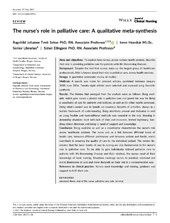| dc.contributor.author | Sekse, Ragnhild Johanne Tveit | en_US |
| dc.contributor.author | Hunskår, Irene | en_US |
| dc.contributor.author | Ellingsen, Sidsel | en_US |
| dc.date.accessioned | 2017-12-20T14:01:25Z | |
| dc.date.available | 2017-12-20T14:01:25Z | |
| dc.date.issued | 2017 | |
| dc.Published | Sekse RJT, Hunskår I, Ellingsen S. The nurse`s role in palliative care: A qualitative meta-synthesis. Journal of Clinical Nursing. 2017 | eng |
| dc.identifier.issn | 0962-1067 | |
| dc.identifier.issn | 1365-2702 | |
| dc.identifier.uri | https://hdl.handle.net/1956/17068 | |
| dc.description.abstract | Aims and objectives: To explore how nurses, across various health systems, describe their role in providing palliative care for patients with life-threatening illnesses. Background: Despite the fact that nurses make up the largest group of healthcare professionals, little is known about their role in palliative care, across health services. Design: A qualitative systematic review of studies. Methods: A search was made for relevant articles, published between January 2000–June 2016. Twenty-eight articles were selected and analysed using thematic synthesis. Results: The themes that emerged from the analysis were as follows: Being available, which gave nurses a pivotal role in palliative care and paved the way for Being a coordinator of care for patients and relatives, as well as for other health personnel. Doing what’s needed was to handle an enormous breadth of activities, always in a holistic framework of understanding. Being attentively present and dedicated as well as using flexible and nontraditional methods was essential in the role. Standing in demanding situations dealt with lack of time and resources, limited legitimacy, handling ethical dilemmas and being in need of support and knowledge. Conclusion: Being available as well as a coordinator characterises the nurse’s role across healthcare systems. The nurse acts as a link between different levels of health care, between different professions and between patient and family, which contribute to ensuring the quality of care to the individual patient. The review illuminates that the basic tenets of care in nursing are also fundamental to the nurse’s role in palliative care. To be able to give individually tailored palliative care to patients with life-threatening illnesses and their relatives, the nurses need all their knowledge of basic nursing. Situations challenge nurses in practical, relational and moral dimensions of care and make demands on their role in a comprehensive way | en_US |
| dc.language.iso | eng | eng |
| dc.publisher | Wiley | eng |
| dc.relation.uri | http://onlinelibrary.wiley.com/doi/10.1111/jocn.13912/epdf | |
| dc.rights | Attribution CC BY-NC | eng |
| dc.rights.uri | http://creativecommons.org/licenses/by-nc/4.0/ | eng |
| dc.subject | advanced illness | eng |
| dc.subject | end of life | eng |
| dc.subject | nurse | eng |
| dc.subject | Palliative care | eng |
| dc.subject | role | eng |
| dc.subject | terminal | eng |
| dc.title | The nurse`s role in palliative care: A qualitative meta-synthesis | en_US |
| dc.type | Peer reviewed | |
| dc.type | Journal article | |
| dc.date.updated | 2017-12-08T08:39:20Z | |
| dc.description.version | publishedVersion | en_US |
| dc.rights.holder | Copyright 2017 The Author(s) | |
| dc.identifier.doi | https://doi.org/10.1111/jocn.13912 | |
| dc.identifier.cristin | 1483423 | |
| dc.source.journal | Journal of Clinical Nursing | |

